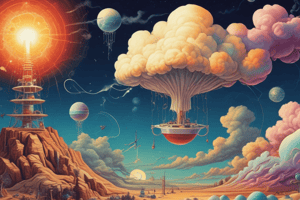Podcast
Questions and Answers
What is energy measured in?
What is energy measured in?
- Watts (W)
- Calories (cal)
- Joules (J) (correct)
- Kilograms (kg)
What type of energy is associated with the movement of particles?
What type of energy is associated with the movement of particles?
- Electrical energy
- Kinetic energy
- Potential energy
- Thermal energy (correct)
What is the law of conservation of energy?
What is the law of conservation of energy?
- Energy cannot be created or destroyed in a closed system, it can only be transferred or transformed from one form to another. (correct)
- Energy is always destroyed in a closed system.
- Energy can be created or destroyed in a closed system.
- Energy cannot be transferred or transformed from one form to another.
What is the process of energy transfer that involves the movement of fluids?
What is the process of energy transfer that involves the movement of fluids?
What type of energy is associated with the energy stored in an object when it is above the Earth's surface?
What type of energy is associated with the energy stored in an object when it is above the Earth's surface?
What occurs in a chemical reaction?
What occurs in a chemical reaction?
What is the system in a chemical reaction?
What is the system in a chemical reaction?
What is temperature often associated with?
What is temperature often associated with?
Flashcards are hidden until you start studying
Study Notes
Energy and Its Forms
- Energy is the ability to do work or cause a change and is measured in units of joules (J).
- There are several forms of energy, including:
- Potential energy (stored energy), which includes:
- Chemical energy (stored in food, fuel)
- Nuclear energy (stored in center of particles)
- Gravitational energy (stored in object when above the earth's surface)
- Energy we experience, which includes:
- Sound energy (energy we hear)
- Light energy (energy we see)
- Kinetic energy (energy from motion)
- Thermal energy (movement by particles, heat)
- Electrical energy (charged particles moving through wire)
- Mechanical energy (moving objects)
- Potential energy (stored energy), which includes:
Energy Transfer
- There are three main processes for energy transfer:
- Conduction: transfer of energy by direct contact
- Convection: transfer of energy by the movement of fluids
- Radiation: transfer of energy by electromagnetic waves
Law of Conservation of Energy
- Energy cannot be created or destroyed in a closed system, it can only be transferred or transformed from one form to another.
- Example: When you hold an ice cube in your hand, the solid water is converted to liquid water as it melts, with energy being transferred from your hand to the ice cube.
Chemical Reactions
- A chemical reaction is a process where a rearrangement of atoms occurs, forming new substance(s) with different properties.
- All chemical reactions involve a transfer of energy between the system and the surroundings, while total energy is conserved.
- Energy cannot be created or destroyed in a chemical reaction; instead, it is either converted from one form to another or transferred between the system and its surroundings.
System and Surroundings
- The system refers to the components involved in the chemical reaction.
- The surroundings encompass everything outside the system.
Temperature
- Temperature is a quantitative measurement often associated with heat.
Studying That Suits You
Use AI to generate personalized quizzes and flashcards to suit your learning preferences.




